LEARN REAL ESTATE FROM THE WORLD'S TOP INSTRUCTORS.
Corporate Finance for Real Estate
Course ID: RE7012
Category: Business
Learn the aspects of corporate finance that are directly relevant to the commercial real estate firm, like REITs, sale-leaseback, and advanced real estate investment analysis.
self-taught course
Duration: 10 Hours
$150.00
USD
Take This Course
breadcrumb
self-taught course Duration: 10 Hours
Coming Soon
Sign up above for more information
Course Summary
This course is about corporate finance as it relates to the Real Estate firm. It guides students through an analysis of concepts, methodologies and techniques in corporate finance, which are general to different types of firms. These include financing decisions, dividend decisions, long-term investment decisions, and the interaction between investment and financing decisions. The course then moves on the explore the issues in corporate finance that are specific to the Real Estate firm, namely: REITs, sale lease-back transactions, and advanced RE investment analysis. (Students who are new to the area of corporate finance may consider taking Joy Chan’s Corporate Finance course, available through the Homburg Academy Courses on Demand portal).
How do I take this course?
This course delivers 10 hours of video lecture presentations on key topics in corporate finance that are specific to the real estate firm. You can download and print a copy of the presentation slides, and make notes as you follow along. To make it easier to absorb the material, each hour is divided into short segments, of about 15 minutes each. You can watch as many, or as few segments each day, or each week, in your own time. Each segment is followed by a short quiz to help you review, and test yourself about what you have learned.
Do I get a Certificate of Completion?
Yes. On completion of this course, you will be able to print a Certificate of Completion showing the overall average that you achieved in all of the quizzes. You may be able to take this to your university or college to ask for transfer credits, or to your professional association to see if you can be awarded continuing education credits.
Can I get credit from Homburg Academy?
These lectures are derived from a course in Homburg Academy’s Masters in Real Estate Finance and Investment programs, and from a course in Homburg Institute’s Diploma programs on real estate finance and investment. If you would like academic credit from Homburg Academy, you may register to take part in weekly video-conference discussions with the professor, and write a final exam. Contact Homburg Academy at myfuture@homburgeducation.org
Dr. Tom Geurts
FRICS, BSc, MS, MS, PhD
Professor Tom Geurts, of George Washington University, holds a PhD in Real Estate and Finance from Pennsylvania State University (1998); an M.S., Economics, University of Amsterdam (1991); an M.S., Political Science, University of Amsterdam (1991), and a B.S., Civil Engineering, Higher Technical College Zwolle (1987). In his distinguished career, Dr Geurts was Director of Academic Affairs of the NYU Real Estate Institute, the largest masters-level real estate program in the world. He has also served as Director of Research, and authored and co-authored quarterly market reports for Manhattan, New Jersey, and Fairfield/Westchester, containing real estate market information, trend analysis, and predictions. Dr Geurts has Presented at twenty-six national and international conferences, taught numerous courses at four universities with high student ratings, gave guest lectures at another seven universities in Europe and North America. He is author of twenty-one academic publications, and will soon publish a book on Global Real Estate Investment in the Homburg-Oxford University Press Advances in Real Estate book series.
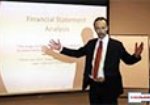
Introduction and Basic Accounting plus Finance Review
This first session provides an overview of financial statement analysis, covering such things as debt, equity, liquidity, EBITDA, Net Present Value, and the life-cycle of firms.
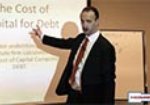
The Cost of Capital
Different forms of capital are more expensive than others. In this session, Dr Geurts shows you the differences between debt financing, equity financing, and delves into the implications of each for the firm. Learn how to calculate the weighted average cost of capital (WACC).
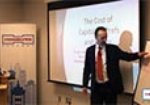
Financial Planning and Forecasting
Delve more deeply into the issues that affect WACC, including floatation costs in the issuance of new equity, and the differences between types of stocks. Delve into the issues surrounding the Capital Asset Pricing Model (CAPM).
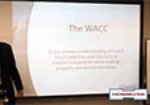
Capital Structure Decisions
This session helps you to understand the various issues that can affect WACC, and leads you methodically through an understanding of advanced concepts in corporate finance.
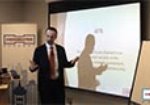
Lease Financing
There are specific issues in real estate that affect the corporate finance options and decisions for the commercial real estate firm, like the vacancy rate of properties, the capital intensity ratio, and the things that affect the profit margin. Follow Dr Geurts as he shows how corporate finance models are related to corporate finance considerations for the real estate firm.
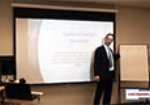
Hybrid Financing
This session leads you to think about the consequences of leverage for the real estate firm, including operating leverage and financial leverage.
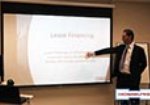
Distributions to Shareholders: Dividends and Repurchases
Understand the yield curve, and also understand some of the off-balance sheet financing, such as leases, that can affect the appearance of risk in the firm.
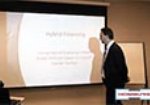
Evaluating Cash Flows
Follow Dr Geurts as he illustrates the differences between warrants and bonds, including convertible and callable bonds, and their impact on the financing of the firm.
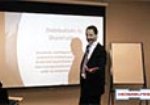
IPOs, Mergers, LBOs, Divestitures, and the Role of Investment Banks
Learn how IPOs can impact the financing of the firm, and how the issuance of dividends and the repurchase of stocks can affect corporate finance.
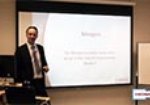
Multinational Financial Management
Learn the difference between a hostile and friendly merger, and understand why Dr Geurts says that acquisitions generally create value.
- 10 hours on-demand lectures
- 204 Quizzes
- 10 downloadable powerpoint slides
- 365 day access
- Mobile access
- Assignments
- Certificate of Completion
-
Corporate Finance
Learn More
-
Introduction to Business
Learn More
-
Statistics
Learn More
-
Strategic Negotiation
Learn More
-
Accounting for Business Managers
Learn More
-
Business Law
Learn More
-
Corporate Finance for Real Estate
Learn More
-
Modern Marketing Essentials
Learn More
Corporate Finance for Real Estate
This is a 10 hour self-taught course and costs $150 USD.
By subscribing you agree to our Terms of Use and Privacy Policy.
If you wish to unsubscribe from our mailing list, please click here.

